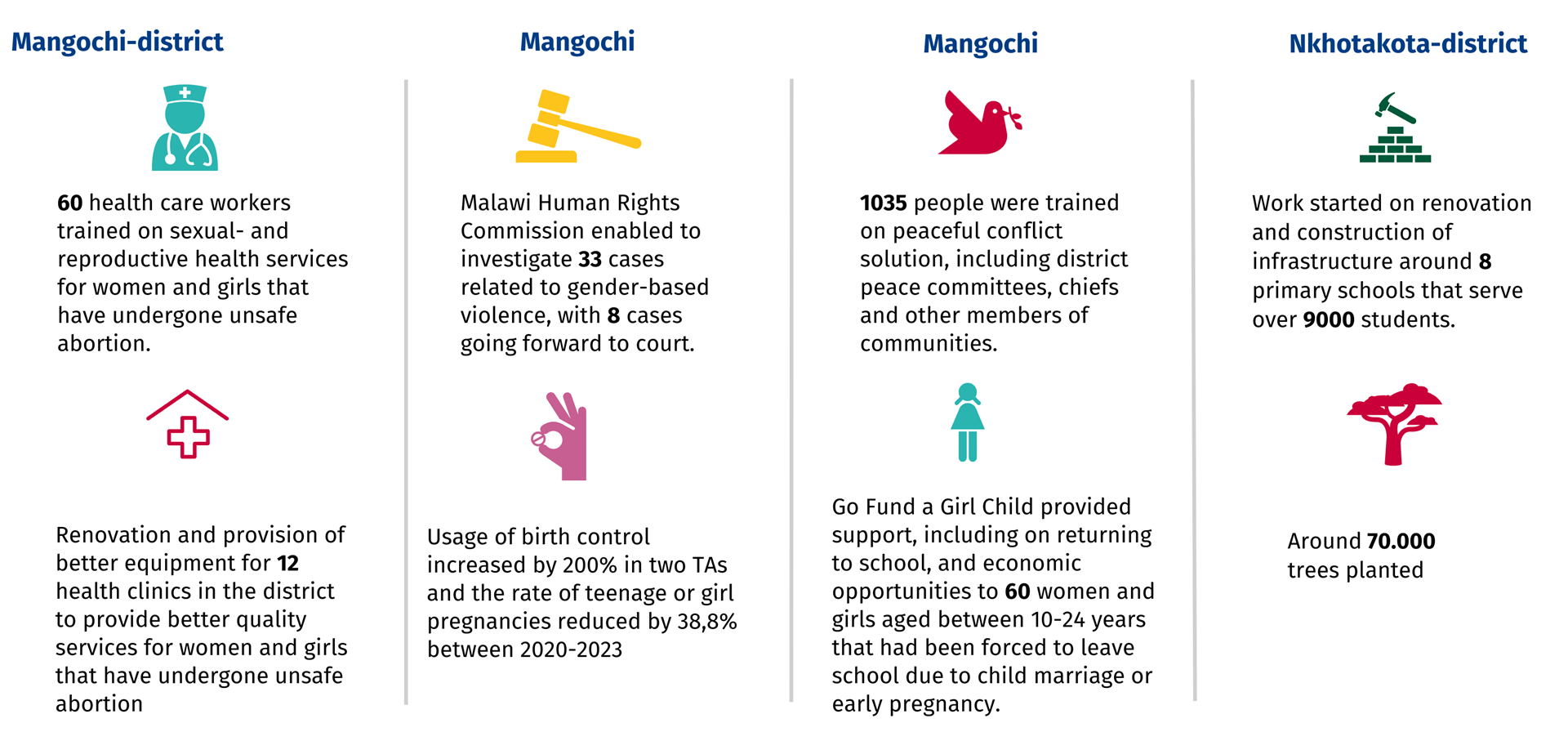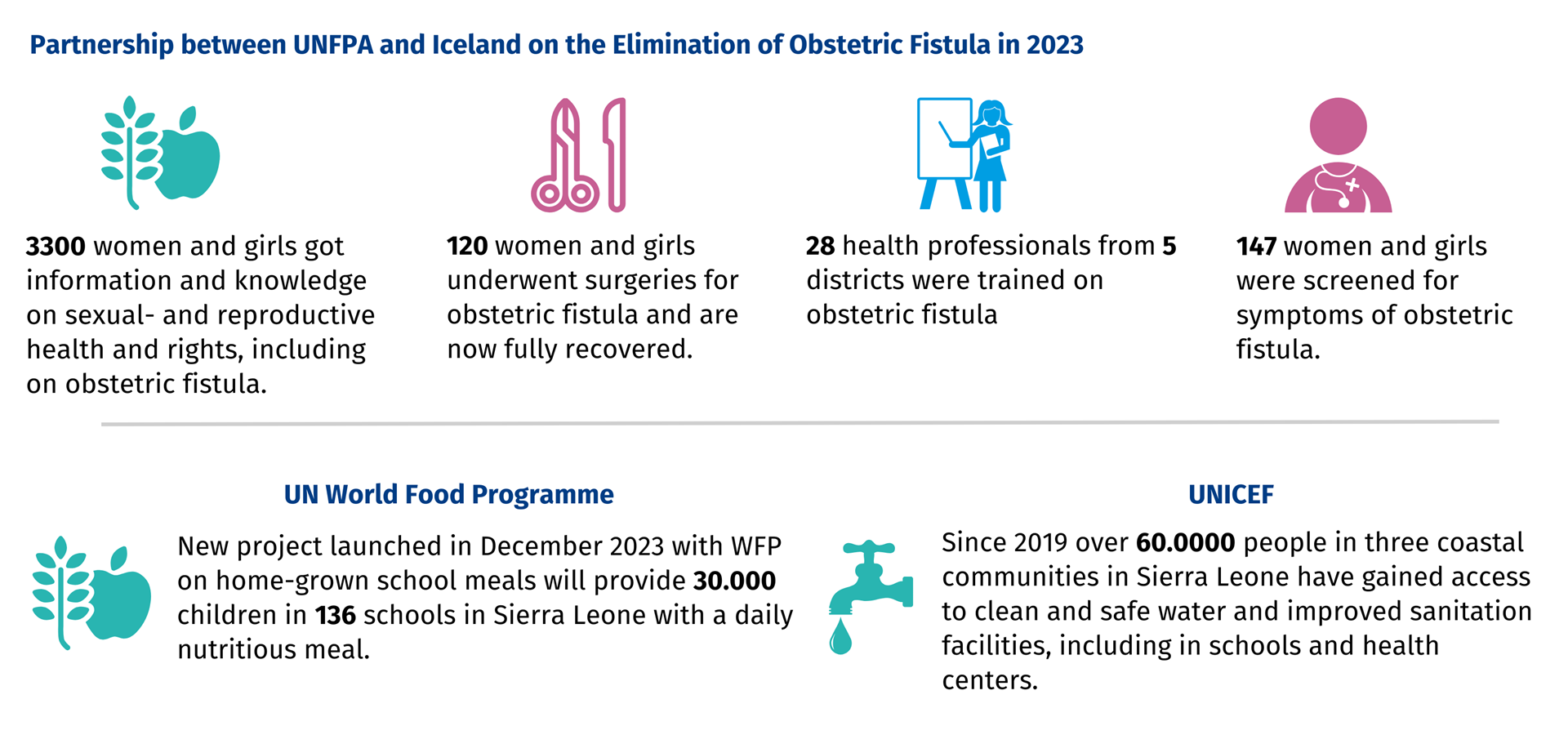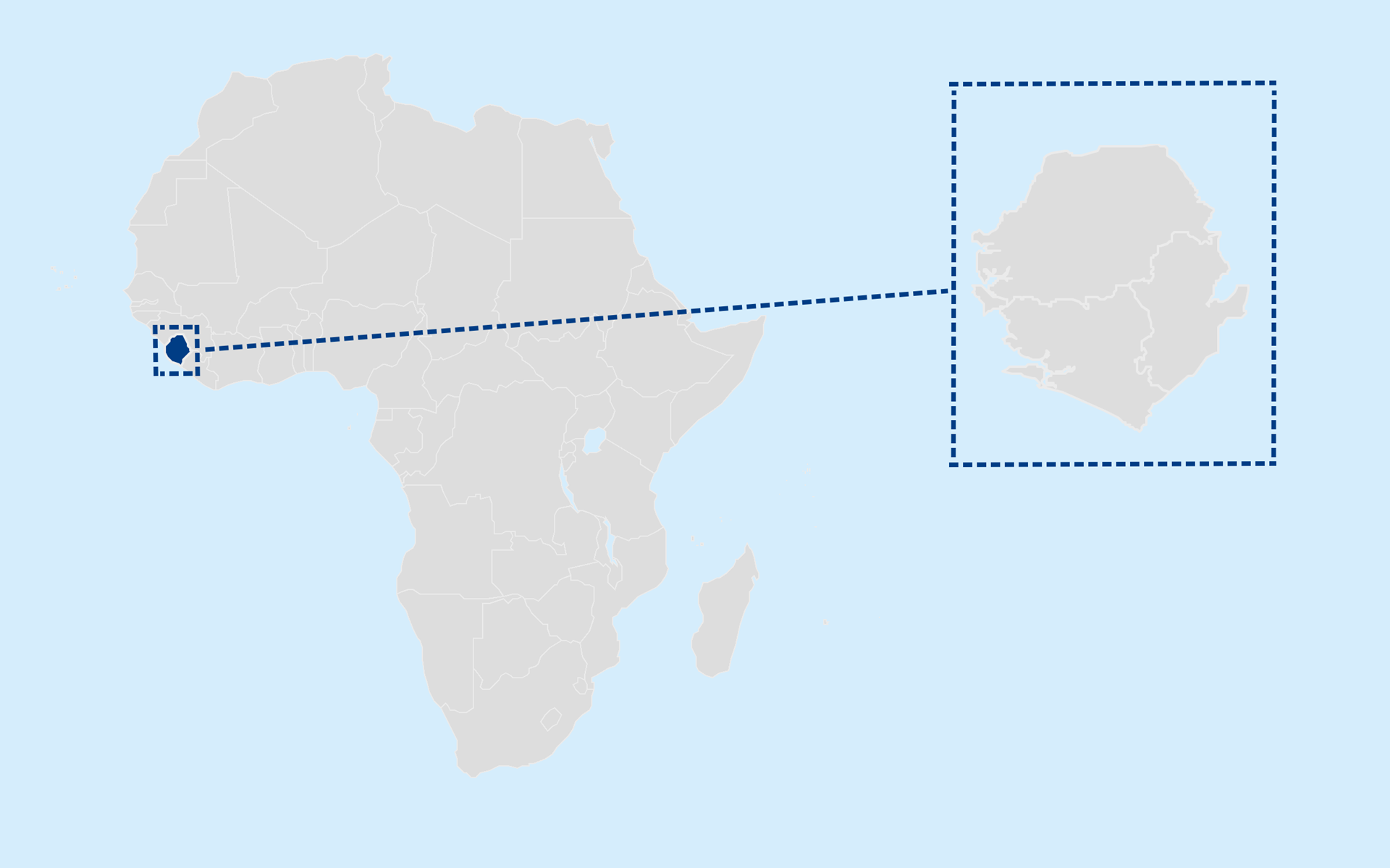Bilateral Cooperation
Bilateral development cooperation is a cornerstone of Iceland’s international development cooperation. Through bilateral country partnerships, Iceland participates directly in development endeavours with strong links to results and impact on the ground. Building on long-term partnerships, Iceland provides funding, technical assistance, and capacity building to contribute to the achievement of the sustainable development goals (SDGs).
The overall goal of Iceland’s development cooperation is to reduce poverty and hunger and promote improved livelihoods, underpinned by human rights, gender equality, and the SDGs. Iceland concentrates its bilateral efforts in low-income countries (LICs) in Africa, working with national governments, district authorities and other development partners, on the basis of a human rights-based approach working with both duty-bearers and rights-holders.
The bilateral partner countries are three; Malawi, Sierra Leone and Uganda, where Iceland’s embassies oversee the implementation of programmes in collaboration with the Directorate of International Development Cooperation at the MFA.
Through its bilateral development cooperation, Iceland participates directly in development efforts in partner countries with strong focus on improving living conditions in poor communities and enhancing the capacity of authorities to provide basic services of adequate quality to their citizens.
Iceland considers respect for human rights, gender equality and empowerment of women and girls as preconditions for progress, prosperity, and economic growth. In line with this, Iceland aims to be a strong partner for strategic programmes to enhance gender equality and human rights by instigating transformative change. Climate and the environment are also increasingly at the forefront, with increased efforts to mainstream activities in district programmes and contributing to the implementation of countries’ strategies and actions.
Strategy and Priority Themes
Iceland‘s work in partner countries is guided by the Bilateral Development Cooperation Strategy, which outlines guiding principles, thematic priorities, and implementation modalities.
Key priority thematic areas in Iceland‘s bilateral cooperation include:
- Iceland aims to reduce poverty and hunger and promote general well-being, with human rights, gender equality and climate and environment as cross-cutting and specific themes through all its development cooperation.
- Assisting partner countries and districts to fulfil their duties to provide access to basic services, including perinatal services, education and water and sanitation.
- Supporting youth employment and women‘s economic empowerment through entrepreneurship training and support to small and medium sized enterprises, with a focus on green and blue jobs.
- The blue economy and fisheries, applying a holistic and integrated approach for the sustainable use of marine resources, protecting marine, coastal and lake ecosystems, while sustaining livelihoods and creating jobs and value for economic growth.
Results of Bilateral Development Cooperation
Bilateral development cooperation has delivered concrete results as confirmed, for instance, by independent evaluations conducted by foreign specialists and peer-reviews by the OECD-DAC.
Malawi 2023

Uganda 2023
.png)
Sierra Leone 2023

Operational Modalities
The collaboration and interventions in partner countries are based on the countries’ own development strategies, including national and district development plans. Local ownership is emphasized, both as a principle and to ensure sustainability. The strategic priorities for Iceland’s cooperation with the respective partner countries are the result of a dialogue and follow the principles of mutual accountability, working in partnership, harmonization and focus on results. Iceland applies a human rights-based approach in its dialogue and programming with partner countries, with a notable emphasis on vulnerable and marginalized groups, including children.
The main aid modality is a district level programme-based approach where resources are provided in support of district development plans, with the aim of strengthening basic service provision. Funds are channelled through local systems to enhance ownership, institutional capacity and sustainability. Long-term partnerships are based on a collective pursuit of national development goals while service delivery is tailored to the local context. This approach has many advantages for small donors such as Iceland by allowing for increased synergies across different sectors and relatively small project teams to work closely with district partners to ensure effective use of our contribution.
Iceland furthermore works with partner organisations, such as UN organisations, CSOs or private sector, for the implementation of specific activities in priority areas. For instance, an ongoing collaboration with WFP in Malawi, Uganda and Sierra Leone on school meals has been successful, services for refugees have been provided in their settlements and host communities in Northern Uganda with UNICEF in Uganda applying an inclusive approach harmonizing needs of different populations, and with UNICEF in Sierra Leone vulnerable communities have gained enhanced access to clean and safe water and sanitation facilities. Furthermore there are ongoing collaboration with UNFPA in Sierra Leone, Malawi and Uganda that aim to end obstetric fistula. The UNESCO-GRÓ Centre Training Programmes play an important role in the implementation of Icelandic development cooperation. Icelandic Civil Society Organisations, in collaboration with local CSOs, support programmes in Iceland‘s partner countries.
Malawi
Development cooperation between Iceland and Malawi started in 1989, through Iceland's bilateral development agency, the Icelandic International Development Agency (ICEIDA). Iceland works in two districts, Mangochi and Nkhotakota. The bulk of Iceland‘s cooperation in Malawi has taken place in Mangochi district in the areas of maternal- and new-born health, education, and water and sanitation. Effective collaboration has been established and maintained with UN organisations, including on sexual and reproductive health with UNFPA and UN WOMEN and on home-grown school meals with WFP.
.png)
Uganda
In Uganda, Iceland‘s collaboration takes place in two districts; Buikwe district where cooperation has been ongoing since 2014, and Namayingo where cooperation started in early 2021. In 2020, a programme which had been ongoing since 2001 in the island district of Kalangala was concluded. The main focus of district programmes is on education and water and sanitation. Moreover, an ongoing programme with UNICEF has provided WASH services for refugees and host communities in Northern Uganda.

Sierra Leone
Development cooperation between Iceland and Sierra Leone began in 2018 with Iceland‘s collaboration with the West African Regional Fisheries Project (WARFP), funded by the World Bank, with the overall objective of supporting the sustainable use of marine resources and enhancing livelihoods in fishing communities. Iceland supported a project component of piloting new, improved fish smoking ovens. Iceland’s focus has been on improving livelihoods in coastal communities through a holistic approach, including WASH and improved handling of fish catches in collaboration with UNICEF in the country and the Sierra Leonean Ministry of Fisheries and Marine Resources.
